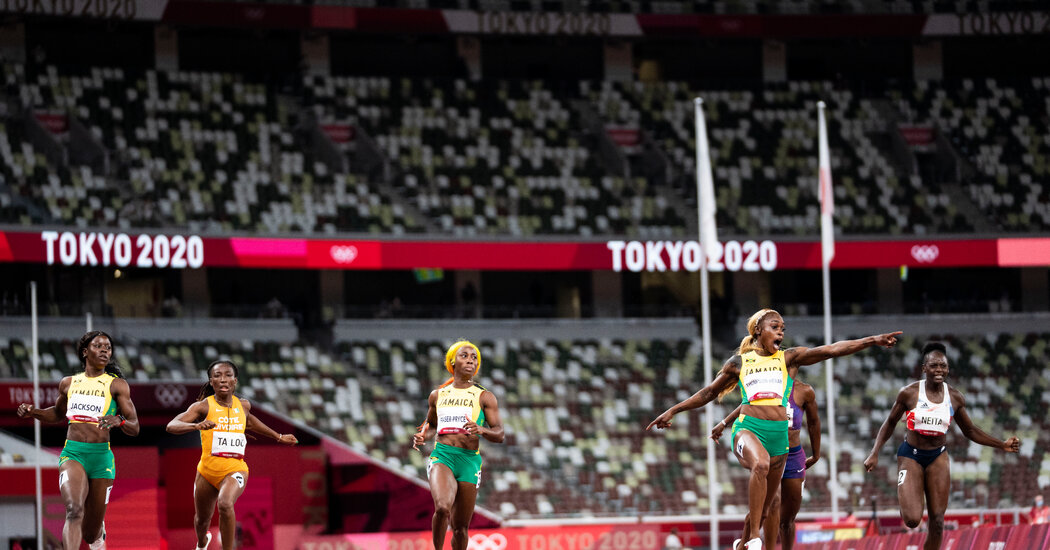
As Usain Bolt, Yohan Blake and Warren Weir posed for photos with the Jamaican flag draped around their backs after a sweep of the 200-meter final at the 2012 Olympics, Jamaica’s dominance in men’s sprinting seemed like it would be interminable.
But after 2012, Jamaica’s superiority in men’s short sprinting outside of Bolt diminished. And since Bolt retired from track and field after the 2017 world championships, Jamaica’s 100-meter and 200-meter sprinters have become an afterthought at the sport’s top levels.
The Jamaican women, meanwhile, have moved into the forefront, running away from the rest of the world.
Led by Shelly-Ann Fraser-Pryce, Elaine Thompson-Herah and Shericka Jackson, Jamaica’s women are in a period of dominance that could lead them to sweep the medal stand in the 100 meters at the world track and field championships Sunday night in Eugene, Ore.
At last summer’s Tokyo Olympics, it was Thompson-Herah, Fraser-Pryce and Jackson who held Jamaican flags while posing for pictures after sweeping the 100-meter Olympic final. Thompson-Herah won in 10.54 seconds, an Olympic record and the second-fastest time ever run. It was the fourth straight 100-meter Olympic gold for the Jamaican women dating to Fraser-Pryce in 2008. Thompson-Herah later won the 200-meter title at the Tokyo Olympics, and the three women teamed up with Briana Williams to win gold in the 4×100 relay in the second-fastest time ever.
Jamaica has produced some of the world’s top female sprinters with athletes like Merlene Ottey, a two-time 200-meter world champion, and Veronica Campbell-Brown, the first Jamaican woman to win an Olympic sprint title. Yet the recent feats of Fraser-Pryce, Jackson and Thompson-Herah are unparalleled.
“There was never any consistency in the high performances of the Jamaican sprinting woman,” Paul Francis, the head coach of the Maximising Velocity and Power Track & Field Club in Jamaica, said.
Fraser-Pryce, Thompson-Herah and Jackson have trained with M.V.P., which was founded in 1999 to develop Jamaica’s top track and field talent instead of sending athletes abroad. (Jackson still trains with the group, but Fraser-Pryce and Thompson-Herah left the club recently.)
This is a golden era of Jamaican women’s short sprinting, Francis said, adding that women have always approached training with a “superior” discipline, focus and work ethic than their male counterparts at the club. “It’s just a difference in attitude,” Francis said.
After the 2012 Olympics, it looked like Blake, who was just 22, was poised to become the small island’s next superstar. In 2011, he ran the second-fastest 200-meter time in history and, later that summer, ran the second-fastest 100. A month before the Olympics, he defeated Bolt in both events at the Jamaican national championships, and in 2011 he became the youngest world champion ever when he won the 100-meter crown.
Weir, also 22, ran what was then the third-fastest Jamaican 200 time ever, and the 4×100-meter relay team of Bolt, Blake, Nesta Carter and Asafa Powell broke its own world record for gold. It was easy to assume another golden era of Jamaican men’s sprinting was on the horizon.
“Both these guys are 22 — I’m going to be 30,” Bolt told reporters in 2012, looking ahead to Blake and Weir’s future after the 200-meter sweep. “I think I’ve had my time.”
But it has been nine years since a Jamaican man not named Usain Bolt won a medal in the 100 or 200 meters at the world championships or Olympics. At last summer’s Olympics, Jamaica did not have a man in the 100-meter final for the first time since the 2000 Olympics. Jamaican men failed to make the podium in the 100 meters, 200 meters and 4×100-meter relay at the Tokyo Games.
“I think athletes like myself and Asafa Powell paved the way for the Jamaican men,” Bolt said in an email, “and maybe the next generation just didn’t understand the level of hard work needed to be amongst the best in the world.”
Bolt also pointed to the injuries that have spoiled Jamaica’s top talent: Blake had grueling hamstring injuries in 2013 and 2014 that have kept him from returning to peak form. Weir earned silver at the 2013 world championships but never returned to that form, retiring at 27 after not making it out of the 200-meter preliminary heats at the 2017 world championships.
The downward trend looked like it could change this year, as Jamaica’s chances at a medal in the men’s 100 meters for this year’s world championships were as promising as they have been in recent memory. Blake, 32, was having a resurgence, running 9.85 seconds in the 100 meters to win Jamaica’s national championship last month, his fastest time since 2012, which tied him for the third-fastest time in the world. Oblique Seville, 21, finished just behind him at 9.86 seconds.
But Blake struggled at the world championships and didn’t qualify for the 100-meter final. Seville ran 9.90 seconds in the 100 final, good enough for fourth place, and he seems destined for the medal stand at future Olympics and world championships. Still, the days of Jamaican male pre-eminence in the short sprints as seen with Bolt, Blake and Weir in 2012 seem to be long gone — all while the women’s superiority looks everlasting.
“There are whispers that the 2004-2016 crop of sprinters represents Jamaica’s golden generation of track,” Campbell-Brown said in an email. “Given our talent pool and organized athletic development program, time will tell if there will be a repeat.”